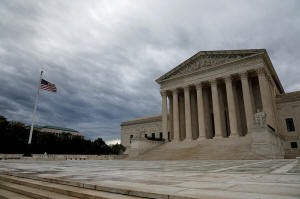US Supreme Court lets $2.46 billion Boy Scouts sex abuse settlement
proceed
 Send a link to a friend
Send a link to a friend
 [February 23, 2024]
By Dietrich Knauth [February 23, 2024]
By Dietrich Knauth
(Reuters) -The U.S. Supreme Court on Thursday allowed the Boy Scouts of
America's $2.46 billion settlement with sexual abuse victims to move
forward, lifting a temporary pause imposed in response to an appeal by
144 former scouts who opposed the agreement.
The order supersedes one issued by Justice Samuel Alito on Feb. 16 that
froze the settlement to give the full court more time to consider a Feb.
9 request by abuse claimants who sought to stop the settlement from
moving forward while they pursue appeals.
The Boy Scouts of America (BSA) filed for bankruptcy in 2020 after
several U.S. states enacted laws letting accusers sue over decades-old
abuse allegations. The organization ultimately reached a settlement,
approved in court in 2022, that would pay abuse victims amounts ranging
from $3,500 to $2.7 million.
The settlement involves more than 82,000 men who have said they were
abused as children by troop leaders while in the Boy Scouts. More than
86% of abuse survivors voted to support the agreement in bankruptcy
court.
The 144 abuse claimants contend the settlement unlawfully stops them
from pursuing lawsuits against organizations that are not bankrupt, such
as churches that ran scouting programs, local Boy Scouts councils and
insurers that provided coverage to the Boy Scouts organization.
Adam Slater, a lawyer representing claimants who supported the
settlement, expressed gratitude that the Supreme Court did not further
delay the Boy Scouts organization's efforts to pay abuse victims.
"With more than 12,400 survivors in this case over the age of 70 and
more than 2,200 over the age of 80, these brave individuals deserve to
receive compensation in their lifetimes," Slater said.

Gilion Dumas, a lawyer representing 67 of the men who have appealed,
said that "the longer this (legal process) goes on, the harder it gets
to reverse" the settlement.
"Getting a Supreme Court stay in a civil case was always a long shot,"
Dumas said. "But we wanted to try everything possible to preserve our
appeal."
Their appeal is due to be heard by the Philadelphia-based 3rd U.S.
Circuit Court of Appeals on April 9.
[to top of second column]
|

A view of the U.S. Supreme Court building on the first day of the
court's new term in Washington, U.S. October 3, 2022.
REUTERS/Jonathan Ernst/File Photo

The men who have appealed the settlement argued that the Boy Scouts
case should remain on hold until the Supreme Court decides whether
U.S. bankruptcy courts can wipe away legal claims against
non-bankrupt people and organizations, an issue the justices are
considering in a case involving OxyContin maker Purdue Pharma's
bankruptcy.
The Supreme Court will decide whether Purdue Pharma's owners,
members of the wealthy Sackler family, can receive immunity in
exchange for paying up to $6 billion to settle thousands of lawsuits
over the company's allegedly misleading marketing of its powerful
pain medication.
The trustee in charge of administering the Boy Scouts settlement,
retired bankruptcy judge Barbara Houser, said following the Supreme
Court's action that she "resumed all operations, including the
evaluation and payment of claims." The settlement trust already has
paid nearly $8 million to more than 3,000 abuse claimants.
The Boy Scouts welcomed the Supreme Court's go-ahead.
"This decision allows the trustee to resume her important work
compensating survivors, and it provides a path for the BSA to
continue its mission delivering scouting to more than a million
young men and women across the country," the organization said in a
statement.
Douglas Kennedy, an abuse survivor who co-led the official committee
representing abuse claimants in the bankruptcy, called the Supreme
Court's quick turnaround good news, but said it still presented
"another emotionally wrenching twist" in the years-long quest by
survivors for closure.
"We are still on pins and needles waiting to see what the final
resolution will be in Purdue," Kennedy said.
(Reporting by Dietrich Knauth and Andrew Chung in New York; Editing
by Will Dunham)
[© 2024 Thomson Reuters. All rights reserved.]This material
may not be published, broadcast, rewritten or redistributed.
Thompson Reuters is solely responsible for this content. |